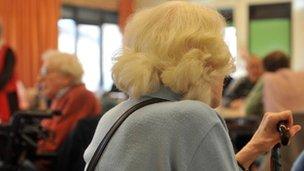Charity WRVS drops 'women' from its name to attract men
- Published

The newly relaunched Royal Voluntary Service organises social activities for older people
A charity set up by women to help efforts on the home front during World War II has changed its name in an effort to attract more male volunteers.
The WRVS - formerly the Women's Royal Voluntary Service - has dropped the "W" to mark its 75th anniversary.
It helps more than 100,000 older people live independently and about 6,000 of its 40,000 volunteers are men.
Chief executive David McCullough said more volunteers than ever were needed to cope with an ageing population.
Originally founded as the Women's Voluntary Services in 1938, the charity was formed to help recruit women into the Air Raid Precautions movement, providing civilians with emergency rest centres, food and first aid.
Now relaunched as the Royal Voluntary Service, it organises social activities for older people, delivers meals on wheels and helps with essential tasks such as food shopping.
'State contracts'
The relaunch comes as a poll of 500 people aged over 75 for the charity by PCP Market Research found that 26% believe they will need support to continue living independently in their homes.
Extrapolating from that survey, RVS says it could mean an estimated 1.3 million elderly people across Britain are in need of help.
Mr McCullough said: "We know that more older people than ever are going to need the support that our volunteers provide, which is why we are changing our name to make it clear we are not a charity that only supports women or just wants female volunteers.
"I'm really proud of the fact that since we were founded 75 years ago as the Women's Voluntary Services, we have inspired volunteers to meet the main social challenges of the time and today we're doing exactly the same.
"As the state contracts and the number of older people grow we are able to provide a solution through our volunteers who want to make a positive difference to the lives of the older people they support."
- Published11 December 2012
- Published18 January 2012